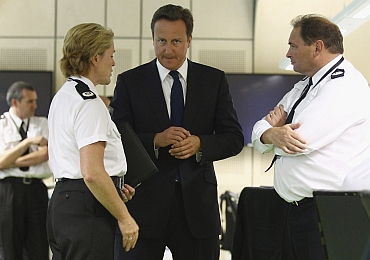
As riot-hit cities of England limped back to normalcy, British Premier David Cameron on Thursday announced a slew of measures to bring back complete order on the streets, promising new powers to police and strong state support to help victims recover losses incurred in the mayhem.
Making a statement during an emergency recall of the parliament, the prime minister admitted there were "far too few" police on the streets and that their tactics had initially not worked, but added this was a new and unique challenge for them.
Over 1,200 persons have been arrested so far in connection with the violence of over the past five days, during which hooded youth and gangsters ran amok, ransacking stores, vandalising cars and robbing whatever came their way.
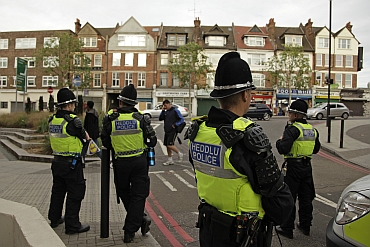
Describing the violence as not a matter of politics or protest but "theft", Cameron said police and intelligence agencies were scurrying through close-circuit television footage to track down all those responsible for the lootings and arson.
"The government will ensure the police have the funds they need to meet the cost of any legitimate claims... The Association of British Insurers has said they expect the industry to be paying out in excess of 200 million," Cameron told lawmakers.
He said police will now be authorised to order people to remove facemasks and their powers to impose curfew will be reviewed.
"So I can announce today that we are going to give the police the discretion to remove face coverings under any circumstances where there is reasonable suspicion that they are related to criminal activity," he said.

Cameron again said that water cannons will be made available to police at a 24-hour notice to deal with such situations.
Outlining the measures to compensate people and companies who were targeted during the riots, Cameron said that any individual, homeowner or business that suffered damage to or loss of their buildings or property as a result of rioting, could seek compensation under the Riot Damages Act, even if uninsured.
"On supporting businesses, we are today setting up a new 20 million high street support scheme to help affected businesses get back up and running quickly," he said.
Cameron admitted that police presence was too less on the streets when the incidents broke out, and said police had initially tried to tackle the situation as a law and order problem, which it was not, it was a criminal issue.
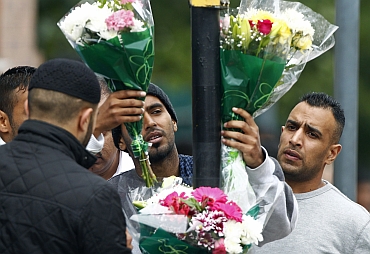
"There were simply far too few police were deployed on to our streets and the tactics they were using weren't working," he told members of Parliament.
"Initially the police treated the situation too much as a public order issue, rather than essentially one of crime.
"The truth is that the police have been facing a new and unique challenge with different people doing the same thing --basically looting -- in different places all at the same time," he said.
The PM also said that law enforcement would see that punishment is imposed on those responsible for sullying the image of the country.
He also paid tributes to the calls for peace made by Tariq Jahan, whose son was among three young British Asians mowed down in Birmingham.
He said, "(Everyone) will have been impressed by the brave words of Tariq Jahan, a father in Birmingham whose son as so brutally and tragically run over and killed".
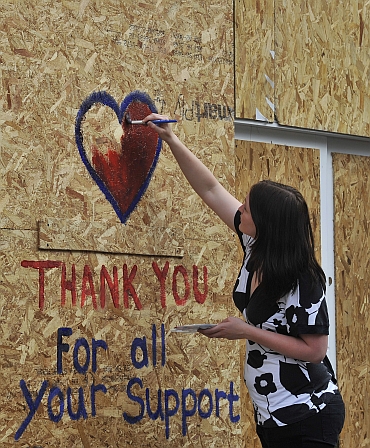
Ed Miliband, leader of the opposition, called Jahan the 'true face of Britain'. Touching on deeper issues involved in the rioting, Cameron said the street gangs were mostly comprised of young boys mainly from dysfunctional homes, and evidence suggests they were behind coordinating the riots.
He also said there was a strong need to address the moral lapse and 'broken' society.
"I have said before that there is a major problem in our society with children growing up not knowing the difference between right and wrong. This is not about poverty, it's about culture. A culture that glorifies violence, shows disrespect o authority, and says everything about rights but nothing about responsibilities".
In too many cases, he said, the parents of these children --"if they are still around" -- did not care where their children were or who they were with. "The potential consequences of neglect and immorality on this scale have been clear for too long, without enough action being taken," he said.
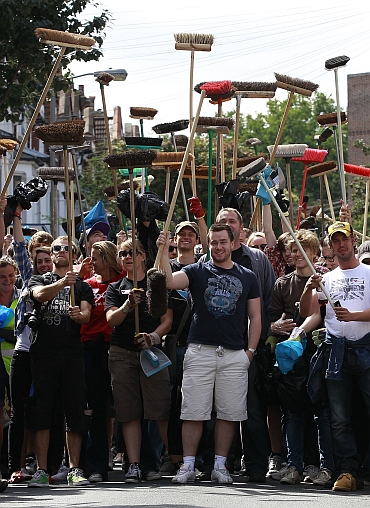
Noting that the world had been watching the events in Britain, he said: "We need to show the world, which has looked on frankly appalled, that the perpetrators of the violence we have seen on our streets are not in any way representative of our country nor of our young people".
He added: "We need to show them that we will address our broken society, we will restore a sense of stronger sense of morality and responsibility; in every town, in every street and in every estate.
A year away from the Olympics, Cameron said the country all the more needs to show the world the Britain "that doesn't destroy, but that builds; that doesn't give up but stands up; that doesn't look back, but always forwards".